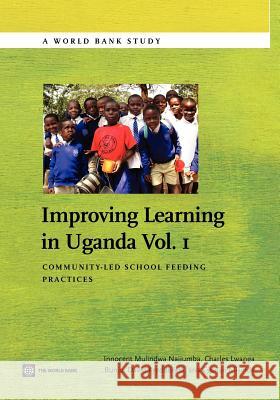Improving Learning in Uganda: Community-Led School Feeding Practices » książka
Improving Learning in Uganda: Community-Led School Feeding Practices
ISBN-13: 9780821397435 / Angielski / Miękka / 2012 / 110 str.
This report is among the first analyses in Africa to examine how parents and communities have taken up the challenge of feeding their children during the school day. It carries important messages for countries throughout Africa and beyond that are seeking to develop sustainable, community-led school feeding programs. Many school systems in Africa have expanded through the introduction of mass education. Uganda has been at the forefront of this reform process and currently grappling with improving the quality of education as is the case with many other countries in the region. Quality enhancement efforts are focused on provision of key inputs. However, with 92 percent of rural children attending school without breakfast and more than 70 percent spending the school day without lunch--there may be a missing element in realizing the desired outcomes. Children who are hungry and/or unhealthy cannot learn, and it also affects their ability to attend and complete school. The book underscores the potential for Uganda to unleash the power of this legislated partnership with parents by removing some of the barriers that currently prevent parents from realizing their full potential to play a role in feeding their children at school. The analysis is grounded on direct observation of sparsely spread school experiences, together with an examination of the cost implications for a national school feeding program. Various school feeding options that could be made available for parents are presented. The need for Government to think beyond a single modality and instead to recognize the need for multiple approaches that reflect the socioeconomic and cultural heterogeneity across households and geographical zones in Uganda stressed. This could be achieved through a sustained and school-led dialogue guided by clear policy spelling out the roles and responsibilities of duty bearers at various levels. The book also recognizes that school feeding not only addresses education needs, but also has the potential to provide a productive safety net by targeting the extremely poor and those vulnerable to exclusion. The emerging role for government to support parental efforts with complementary programs such as de-worming and other school health initiatives is also articulated.











